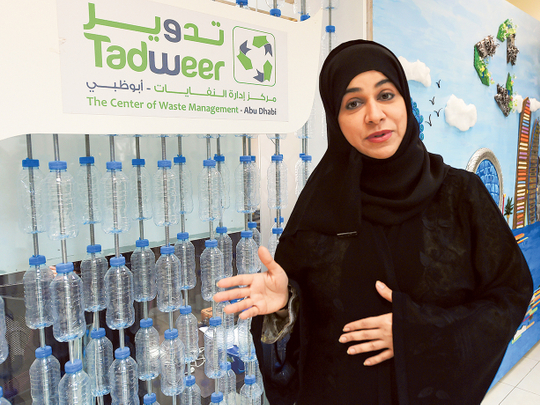
Abu Dhabi: Waste segregation and the culture of sustainability taught at school should be reflected at home and should not be hindered by parents’ misunderstandings of the topic, an expert in the capital said.
Speaking to Gulf News, Fatima Al Harmoudi, Public Awareness Officer at Tadweer (the Centre of Waste Management, Abu Dhabi), said the ‘Less waste ... More Beautiful Emirate’ school programme launched in 2014 has had tremendously positive outcomes but a number of challenges remain as well.
“When we first approached schools in 2013, we found that the majority of educators and students were unfamiliar with the concept of waste segregation — an imperative step towards recycling,” she said.
Green bins should contain recyclable materials while other waste such as used tissues and food should be placed in black bins.
“Additionally, when food waste is mixed with plastic, paper, carton and aluminium cans, the recyclables’ economic value declines. Therefore it is very important to separate the two,” she added.
The biggest challenge facing students is the clash that occurs between what they are taught in school and what they practise at home.
“In Japan, students of varying social classes clean up their classrooms every day. I have received a number of complaints from parents claiming that their children are not ‘housemaids’ and should not be cleaning at school. This is very shocking to me,” she said.
With older students, the issue is reversed.
“A 17 year-old girl from a school told her teacher that she has a maid at home that cleans up, so she shouldn’t be doing that sort of work at school!” the expert revealed.
Such behaviour is unacceptable and hinders the progress towards living in an environment with minimal food waste.
“Food waste increases by 10 per cent during Ramadan. To tackle the issue of food waste at schools, we told administrations to let the students eat in cafeterias or canteens to allow classroom bins to majorly contain recyclable materials.”
Al Harmoudi also advised that food being sold at school should not come in large portions so that students are not forced to discard the rest when feeling full.
“This also helps combat child obesity. Instead of selling a large sandwich for Dh4, sell half of the amount for Dh2 and if the child gets hungry, they can purchase another one,” she said.
After extensive awareness campaigns held throughout the school year, Al Harmoudi’s team was finally able to see results.
“The Abu Dhabi City Municipality, the Abu Dhabi Education Council and Tadweer set up a committee to closely monitor schools’ performance in integrating the culture of segregating waste through reports and field visits. The top nine schools were given a trophy made purely using recycled material,” she said.
To send a message to parents who teach their children that they are superior to cleaning up after themselves, Tadweer distributed pamphlets showing an Emirati family saying: “Cleanliness is not the responsibility of cleaners only, but also the responsibility of all. This is why we are encouraging our children to volunteer to clean up their surroundings. It is not disgraceful act or something that damages one’s dignity, but a noble character indeed.”
In fact, some private schools managed to sell their waste to specialised companies for a sum of money and families across Abu Dhabi can do the same. A list of authorised waste collecting companies can be found on Tadweer’s website.












